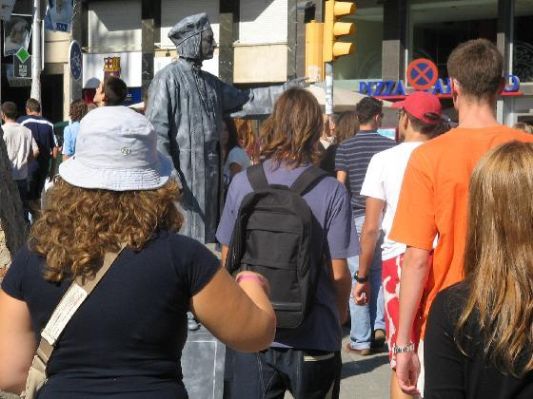Dashing
up the steps of an Alicante-bound jet at
Manchester Airport in pouring rain and a
furious early-morning gale is a favourite memory of my ever-dwindling trips
home to the UK.
The race across
the runway to the aircraft was invariably sheer pleasure because I was about to
swap the cold, miserable British weather for the Costa Blanca life I
so adore.
Apart
from the shivering, soggy climate, my visits to the UK continue to highlight why
living in England today is more of a penance than a joy.
Yes, the
beautiful countryside, unique historic buildings and ironic British sense of
humour are still intact. But the breakdown of law and order and increasingly
large sub-culture of yobbism, alcoholism and drug addiction is frightening.
I won’t
go into the most controversial subject of all – the over-immigration which is
polarising rather than uniting the country. That would be politically
incorrect, even if my personal viewpoint is considerably less extreme than that
of many native Brits.
One subject that really does make my blood boil is the unnecessary traffic chaos
and the incompetence of the faceless bureaucrats responsible for the massive
disruption on motorways and trunk roads.
Everywhere
I drove, I seemed to be held up – from an enforced 30-mile motorway detour to
accommodate a bridge-building exercise, to temporary traffic lights causing
hold-ups on virtually every main road. The general philosophy of the transport
bureaucrats seemed to be, ‘‘Cause maximum disruption to as many motorists as
possible at the time the traffic is heaviest’’.
I don’t tend to drive in busy areas in Spain,
but in ten years of part-time residence in the
southern Costa Blanca, I have
never seen a traffic jam, let alone the
gridlock of vehicles that snarls up UK cities almost permanently.
The
Spanish attitude to traffic accidents and road maintenance seems to be the
exact opposite to that of the British authorities. The priority after a pile-up
is to get the traffic moving again – and to carry out repairs only when they
are essential. Hence the road surface can be very iffy.
The consolation Is that
you’ll never be caught in a 10-mile queue on the M6, with two lanes blocked by
a cone army and an invisible work force. In
England, I rarely go out without being stuck in a queue of crawling cars.
I also
had the dubious pleasure of clashing with the council jobsworths who monitor
minor traffic offenders in Bury, Lancashire, where my UK home is. I lost the
battle, of course, because being fair did not tally with their mission to fill the town coffers with as much
cash as possible from the softest touches of all – law-abiding motorists.
I was
blissfully unaware that since the my previous visit to the UK, Bury Council had
decided to prohibited one particular bus lane to other vehicles from 7am to 7pm
on weekdays, rather than the normal 7-10am and 4-7pm double slot which operated
for every other bus lane in Greater Manchester.
My
‘crime’ was that I went on a lunchtime shopping trip on a quiet weekday and, at
12.38pm, moved my little Kia Picanto into the empty bus lane momentarily to
allow the only other car on the road to pass me. It hadn’t crossed my mind to
check the hours of prohibition first – I naturally assumed the rules were the
same as everywhere else.
Gotcha! The council spiders had set up a camera to trap heinous criminals like myself in their devious web. And three days later I received photographic evidence of my car tootling along in the bus lane at 25mph, plus a demand for £60 – reduced to £30 if I paid within 14 days.
How kind
of them to penalise an unknowing pensioner for being courteous to another
driver and clearly having no intention of using the bus lane to jump a queue or
for any dubious reason.
A few days later I received a written reply from Bury’s Parking Services Manager in which grammar and accuracy were given low priority.
(Sic) ‘’I have noted your comments, however, upon further investigation of your case it is apparent that full payment of the Notice has been made,’’ he wrote, as if that was a reason the fine could not be reversed.
‘‘I can confirm that there is ample signage at the entrance to the bus lane specifying the relevant start and end times. The onus is on the motorist to check the information before making the judgement to enter a bus lane.
”Thank you for your prompt payment, however, I would like to inform you that any further right to appeal is lost and the case is now closed.’’
That’s it, then. Guilty as charged, and no reference whatsoever to my explanation.
In Spain, the Trafico has some weird regulations and if you are unlucky, you could find yourself forking out 100 euros for driving in flip-flops or carrying your shopping on the back seat.
If you are really unlucky, you might even be fined for speeding in Barcelona when you have never been within 300 kilometres of the place. Fortunately, the photo accompanying the ticket showed a different make of car – albeit with what appeared to be the registration number of my Kia Picanto.
A quick call to the Trafico sorted that one out. They cancelled the ticket even more rapidly than Bury council’s greed machine scoffed my credit- card payment.















